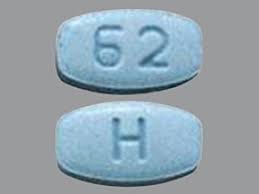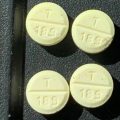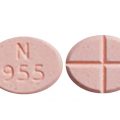What is H 62 Pill?
The pill with imprint H 62 contains Aripiprazole 5 mg. It is supplied by Aurobindo Pharma Limited. Aripiprazole was discovered by scientists at Otsuka Pharmaceutical and was called OPC-14597. Otsuka initially developed the drug and partnered with Bristol-Myers Squibb (BMS) in 1999 to complete development, obtain approvals, and market aripiprazole. It was approved by the FDA for schizophrenia on November 15, 2002, and the European Medicines Agency on 4 June 2004; for acute manic and mixed episodes associated with bipolar disorder on October 1, 2004; as an adjunct for major depressive disorder on November 20, 2007. In 2006, the FDA required the companies to add a black box warning to the label, warning that older people who were given the drug for dementia-related psychosis were at greater risk of death.
What Is H 62 Aripiprazole Used For?
Aripiprazole is used in the treatment of bipolar disorder; agitated state; autism; depression; schizophrenia and belongs to the drug class atypical antipsychotics. Risk cannot be ruled out during pregnancy. Aripiprazole 5 mg is not a controlled substance under the Controlled Substances Act (CSA). This medication can decrease hallucinations and improve your concentration. It helps you to think more clearly and positively about yourself, feel less nervous, and take a more active part in everyday life. Aripiprazole can treat severe mood swings and decrease how often mood swings occur.
Bipolar disorder
Aripiprazole is effective for the treatment of acute manic episodes of bipolar disorder in adults, children, and adolescents. Used as maintenance therapy, it is useful for the prevention of manic episodes but is not useful for bipolar depression. Thus, it is often used in combination with an additional mood stabilizer; however, co-administration with a mood stabilizer increases the risk of extrapyramidal side effects. SEE: Bipolar Test
Major depression
Aripiprazole is an effective add-on treatment for major depressive disorder; however, there is a greater rate of side effects such as weight gain and movement disorders. The overall benefit is small to moderate and its use appears to neither improve quality of life nor functioning. Aripiprazole may interact with some antidepressants, especially selective serotonin reuptake inhibitors (SSRIs). There are interactions with fluoxetine and paroxetine and lesser interactions with sertraline, escitalopram, citalopram, and fluvoxamine, which inhibit CYP2D6, for which aripiprazole is a substrate. CYP2D6 inhibitors increase aripiprazole concentrations to 2-3 times their normal level.
Autism
Short-term data (8 weeks) shows reduced irritability, hyperactivity, inappropriate speech, and stereotypy, but no change in lethargic behaviors. Adverse effects include weight gain, sleepiness, drooling, and tremors. It is suggested that children and adolescents need to be monitored regularly while taking this medication, to evaluate if this treatment option is still effective after long-term use and note if side effects are worsening. Further studies are needed to understand if this drug is helpful for children after long-term use.
Obsessive-compulsive disorder
A 2014 systematic review concluded that add-on therapy with low-dose aripiprazole is an effective treatment for an obsessive-compulsive disorder that does not improve with SSRIs alone. The conclusion was based on the results of two relatively small, short-term trials, each of which demonstrated improvements in symptoms. Risperidone (another second-generation antipsychotic) appears to be superior to aripiprazole for this indication and is recommended by the 2007 American Psychiatric Association guidelines, though aripiprazole is cautiously recommended by a 2017 review by Pignon and colleagues. 10 Things You Should Know About Mental Health Illnesses and Problems
How to use H 62 Aripiprazole Pill
Read the Medication Guide and, if available, the Patient Information Leaflet provided by your pharmacist before you start taking aripiprazole and each time you get a refill. If you have any questions, ask your doctor or pharmacist.
Take this medication by mouth with or without food as directed by your doctor, usually once daily. The dosage is based on your medical condition, response to treatment, age, and other medications you may be taking. Be sure to tell your doctor and pharmacist about all the products you use (including prescription drugs, nonprescription drugs, and herbal products). To reduce your risk of side effects, your doctor may direct you to start this medication at a low dose and gradually increase your dose. Follow your doctor’s instructions carefully.
The manufacturer directs to swallow this medication whole. However, many similar drugs (immediate-release tablets) can be split/crushed. Follow your doctor’s direction on how to take this medication.
If you are using the liquid form of this medication, carefully measure the dose using a special measuring device/cup. Do not use a household spoon because you may not get the correct dose.
Do not increase your dose or use this drug more often or for longer than prescribed. Your condition will not improve any faster, and your risk of side effects will increase.
It may take several weeks before you get the full benefit of this drug. Use this medication regularly to get the most benefit from it. To help you remember, take it at the same time each day.
It is important to continue taking this medication even if you feel well. Do not stop taking this medication without consulting your doctor. Some conditions may become worse when this drug is suddenly stopped. Your dose may need to be gradually decreased.
H 62 Aripiprazole 5mg Side Effects
Side effects include dizziness, lightheadedness, drowsiness, nausea, vomiting, tiredness, excess saliva/drooling, blurred vision, weight gain, constipation, headache, and trouble sleeping may occur. If any of these effects persist or worsen, tell your doctor or pharmacist promptly.
Dizziness and lightheadedness can increase the risk of falling. Get up slowly when rising from a sitting or lying position.
Remember that your doctor has prescribed this medication because he or she has judged that the benefit to you is greater than the risk of side effects. Many people using this medication do not have serious side effects.
Tell your doctor right away if you have any serious side effects, including fainting, mental/mood changes (such as increased anxiety, depression, suicidal thoughts), trouble swallowing, restlessness (especially in the legs), shaking (tremor), muscle spasm, mask-like expression of the face, seizures, trouble controlling certain urges (such as gambling, sex, eating or shopping), interrupted breathing during sleep.
This medication may rarely make your blood sugar rise, which can cause or worsen diabetes. Tell your doctor right away if you have symptoms of high blood sugar such as increased thirst/urination. If you already have diabetes, check your blood sugar regularly as directed and share the results with your doctor. Your doctor may need to adjust your diabetes medication, exercise program, or diet.
This medication may rarely cause a condition called tardive dyskinesia. In some cases, this condition may be permanent. Tell your doctor right away if you develop any unusual uncontrolled movements (especially of the face, mouth, tongue, arms, or legs).
This medication may rarely cause a very serious condition called neuroleptic malignant syndrome (NMS). Get medical help right away if you have any of the following symptoms: fever, muscle stiffness/pain/tenderness/weakness, severe tiredness, severe confusion, sweating, fast/irregular heartbeat, dark urine, signs of kidney problems (such as a change in the amount of urine).
A very serious allergic reaction to this drug is rare. However, get medical help right away if you notice any symptoms of a serious allergic reaction, including fever, swollen lymph nodes, rash, itching/swelling (especially of the face/tongue/throat), severe dizziness, trouble breathing.
This is not a complete list of possible side effects. If you notice other effects not listed above, contact your doctor or pharmacist. The 5 Prerequisites for Sound Mental Health






